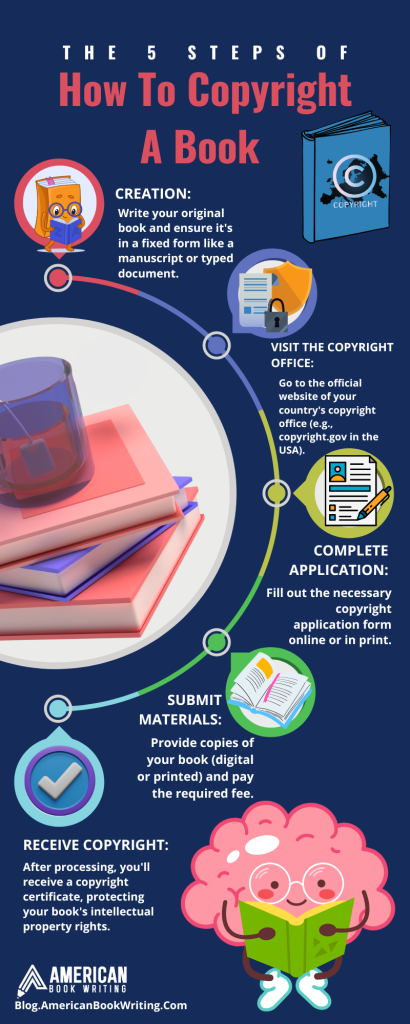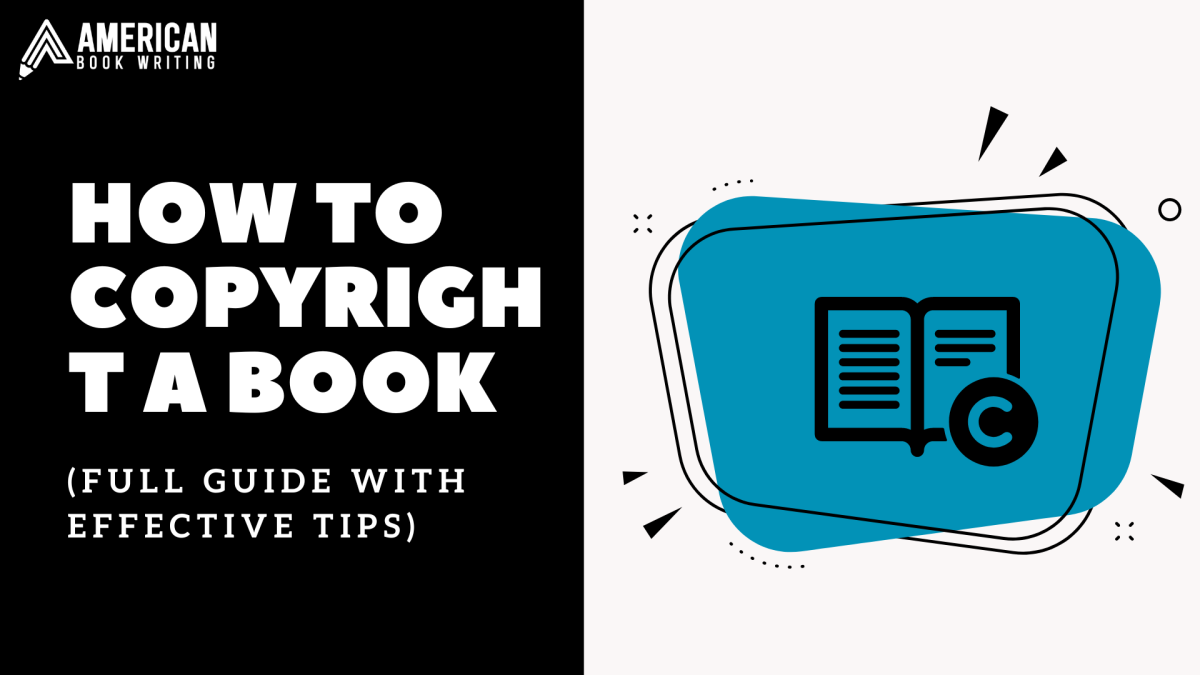Copyright a Book
Press The Play Button On The Audio To Listen Complete Article!
Copyright a book is a legal right that gives the creator of an original work, like a book, the right to make copies, sell them, and put them on show.
If you want to write a book and have a great story to tell? But also want to protect your writing and ensure no one else can use it? Start learning about copyrighting. It gives writers the power to control how their works are used and ensures they get credit and money for their work.
Whether you’ve been writing for a long time or this is your first book, knowing how to copyright a book is an important step to success.
How to Protect a Book’s Rights?
Now, let’s take a step-by-step look at how to copyright a book:
Step 1: Finish Writing Your Book:
Try your book is finished and in its final form before you try to get copyright protection. Do all of the editing, rewriting, and reviewing that needs to be done is done.
Step 2: Know The Law About Copying:
Find the laws in your country or area about copyright. The steps and standards for copyright registration may be different in different places.
Step 3: Keep Proof of Your Copyright:
Your book is protected by copyright from the moment it is written, but it’s important to keep proof of your by translating a Book to Spanish copyright. This could mean keeping copies of your manuscript, drafts, and any important letters about your book with dates on them.
Step 4: Get Your Copyright Registered:
To register your copyright, you must fill out the right forms and send them to the right office. Give true information about who you are as an author and what your book is about.
Step 5: Determine Your Copyright Options:
Choose how you want to protect your book from being stolen. Most of the time, books are protected because they are creative works. But if your book has drawings, photographs, or other artistic aspects, you may need to copyright a book as soon as possible.
Step 6: Consider International Copyright Protection:
If you want to sell your book in other countries, you should get copyright protection there. Some countries may need you to register more or follow certain foreign copyright agreements.
Copyright Violations and Enforcing the Law:
Books are considered literary works, so they are instantly protected by copyright when made in a fixed form, like a book or a digital file. But to Outline Your Novel with the right copyright office gives you more legal protections, such as the right to sue for damages if someone steals your work.
Even if steps are taken, there is still a chance that copyright will be broken. If you find out someone is using your book without your permission, talk to a lawyer specializing in intellectual property to find out how to stop them and whether you can take legal action against them.
Benefits of How to Copyright a Book:
Legal Security:
Copyright a book gives you legal security and proves that you own it. It gives you the right to be the only person who can copy, share, show, and perform your work.
Deterrent for Infringement:
When your book has legal copyright, it stops people from stealing your work. It clarifies that you care about your intellectual property rights and are ready to go to court if you have to.
Statutory Damages and Legal Remedies:
You can get statutory damages and legal remedies if you register your copyright before someone else uses it without your permission. This means that if someone takes your work or uses it without your permission, you may be able to get money and use the law to protect your rights.
Licensing and Royalties:
If you own the copyright to your work, you can permit other people to use it. You can work out licensing deals and get royalties to make sure you make money from your book’s use in ways other than straight sales.
Global Protection:
Copyright security goes beyond the borders of individual countries. International treaties mean that if your book is covered by copyright in your home country, it will usually be protected in many other countries.
Professional Credibility:
Giving your book a copyright gives it a certain amount of professionalism and credibility. It shows that you care about your creative work and want to protect it, which can help your image as an author.
Preservation of Integrity:
If you own the rights to your book, you can decide how it is used and shown. Copyright a book gives security and lets you keep your work’s integrity by ensuring it doesn’t get changed or misrepresented without your permission.
Drawbacks of Copyright:
- Cost: Copyright filing fees can be different based on where you live and what kind of work you want to protect. Some writers, especially those on a tight budget, may be unable to sign up because of how much it costs.
- Time-Consuming Process: Registering copyright can take time because you must fill out forms, gather paperwork, and wait for permission. This extra administrative work might be seen as a downside, especially by writers who would rather spend all of their time on their creative work.
- Not a Life Time Contract: Copyright, a book only lasts for a certain amount. It last for different amounts of time in different countries, but usually for the author’s life plus a certain number of years. After this time, the work is in the public domain, meaning anyone can use or copy it without asking.
- Infringement: Even though registering your copyright improves your legal claim, enforcing your rights can still be hard. Legal cases can be expensive and take a long time. Also, finding and going after possible infringers may take time, money, and work.
- Different Rules and Laws: Copyright laws change from country to country, and it can be hard to figure out how to protect your work internationally. It can be hard to keep track of the rules in different countries, especially when working with translations or global distribution.
- Possible Copyright Trolls: Sometimes, people or organizations may use copyright claims to hurt creation or give them undeserved financial benefits. These “copyright trolls” may make false claims or use predatory tactics, making writers’ legal situations more complicated than they need to be.
Tips on How to Copyright a Book:
Make a Complete and Fixed Version:
Before you try to get copyright protection for your book, ensure it is in its final, complete form. Double-check if it has been edited, reviewed, and is ready to go. Your work should be saved in a way that can be seen and touched, like a hard copy or a digital file.
Be Aware of Legalities:
Learn the copyright rules of your country or the country where you want to register your copyright. Different places may have different rules and requirements, so knowing the exact rules and steps is important.
Use the Symbol and the Copyright Notice:
Show the copyright symbol (), the year of the first release, and your name as the copyright owner of the book writing service. This note should be in a clear place in your book, usually on the title page or the page that says “copyright.” The notice lets readers and people who might steal your work know it is safe.
Know the Registering Process:
Your copyright is automatically protected when you make something, but entering it with the right authority gives you more benefits. It strengthens your legal claim, publicly records your ownership, and gives you the right to court if someone else uses your work without your permission. Find out how to register copyright in your country, and then do what you must to register your book.
Maintain Records:
Keep detailed records of your writing process, including drafts, changes, and any communication related to your book. If you ever need to prove that your work is yours and that you made it, you can use these records as proof.
Update Your Work:
Put a date on your book and any important changes or improvements. This records your creative process and can help prove that your work is original and important.
Think About Getting Legal Advice:
If you have specific concerns or complicated copyright problems, talk to a lawyer specializing in intellectual property law. They can give you help that fits your needs and walk you through the copyright process, ensuring your rights are protected.

Conclusion:
Keep an eye on the market for any illegal use or infringement of your intellectual property. Use online tools and copyright monitoring services, and look for possible violations independently. If you find out someone is using your information without your permission, talk to a lawyer about how to protect your rights.




